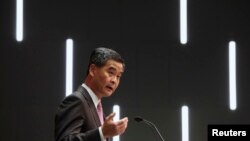Hong Kong's leader has defended his role in allowing a fugitive former U.S. intelligence contractor to leave the territory on Sunday despite demands by Washington for the American's extradition.
Hong Kong Chief Executive Leung Chun-ying said Monday there was "no legal basis" to stop Edward Snowden from leaving the city while authorities were processing the U.S. extradition request and "asking (Washington) for further important information" on the case.
The former U.S. National Security Agency contractor faces U.S. charges of espionage for disclosing clandestine American surveillance programs.
U.S. National Security Council spokesperson Caitlin Hayden said Sunday Washington is "disappointed" by the decision to permit Snowden to flee Hong Kong. She said the United States had submitted a "legally valid" request to Hong Kong to arrest him for purposes of extradition under a bilateral agreement.
Hayden also said Washington registered "strong objections" to Hong Kong authorities and the Chinese government and noted that such behavior is "detrimental" to U.S.-Hong Kong and U.S.-China relations.
Leung acknowledged what he called "expressions of displeasure" from some authorities in the United States.
But, he insisted Snowden's departure from Hong Kong as a "normal passenger" on a Russian flight to Moscow was lawful.
"This is a good example to illustrate 'one country, two systems', Hong Kong people ruling Hong Kong, and the high degree of autonomy that we have," said Leung. "It is also a good example to illustrate the rule of law that we uphold and the procedural fairness and justice that we uphold."
Under the one country-two systems concept, Hong Kong has autonomy on social and economic affairs but Beijing exercises authority over matters of foreign policy and defense.
A U.S. official told Western news agencies on Sunday that Washington revoked Snowden's passport the day before to try to prevent him from traveling beyond Hong Kong, where he had been in hiding for a month since fleeing his home in Hawaii. Leung said Hong Kong authorities had not received any U.S. documents showing that Snowden's passport was invalid.
Hong Kong anti-establishment lawmaker Albert Ho disputed Leung's suggestion that the government handled the Snowden case independently.
Ho said he met with Snowden to offer legal advice and learned that a "middleman" had urged the American to depart the city, promising safe passage to a third country. The lawmaker said Hong Kong officials declined to tell him anything about the safe passage offer, leading him to suspect the middleman acted on the orders of Beijing, leaving the city's government with little say in the matter.
Ho is a longtime critic of perceived Chinese government interference in Hong Kong affairs.
Some analysts said it appears that China orchestrated Snowden's exit to avoid a potentially lengthy legal battle in Hong Kong over the U.S. extradition request. They said Beijing wants to prevent the case from becoming an additional irritant in its already testy relationship with Washington.
Chinese Foreign Ministry spokeswoman Hua Chunying said Monday that Beijing "respects" the Hong Kong government's handling of Snowden. She gave no details about any role the Chinese government might have played in the case.
Hong Kong Chief Executive Leung Chun-ying said Monday there was "no legal basis" to stop Edward Snowden from leaving the city while authorities were processing the U.S. extradition request and "asking (Washington) for further important information" on the case.
The former U.S. National Security Agency contractor faces U.S. charges of espionage for disclosing clandestine American surveillance programs.
U.S. National Security Council spokesperson Caitlin Hayden said Sunday Washington is "disappointed" by the decision to permit Snowden to flee Hong Kong. She said the United States had submitted a "legally valid" request to Hong Kong to arrest him for purposes of extradition under a bilateral agreement.
Hayden also said Washington registered "strong objections" to Hong Kong authorities and the Chinese government and noted that such behavior is "detrimental" to U.S.-Hong Kong and U.S.-China relations.
Leung acknowledged what he called "expressions of displeasure" from some authorities in the United States.
But, he insisted Snowden's departure from Hong Kong as a "normal passenger" on a Russian flight to Moscow was lawful.
"This is a good example to illustrate 'one country, two systems', Hong Kong people ruling Hong Kong, and the high degree of autonomy that we have," said Leung. "It is also a good example to illustrate the rule of law that we uphold and the procedural fairness and justice that we uphold."
Under the one country-two systems concept, Hong Kong has autonomy on social and economic affairs but Beijing exercises authority over matters of foreign policy and defense.
A U.S. official told Western news agencies on Sunday that Washington revoked Snowden's passport the day before to try to prevent him from traveling beyond Hong Kong, where he had been in hiding for a month since fleeing his home in Hawaii. Leung said Hong Kong authorities had not received any U.S. documents showing that Snowden's passport was invalid.
Hong Kong anti-establishment lawmaker Albert Ho disputed Leung's suggestion that the government handled the Snowden case independently.
Ho said he met with Snowden to offer legal advice and learned that a "middleman" had urged the American to depart the city, promising safe passage to a third country. The lawmaker said Hong Kong officials declined to tell him anything about the safe passage offer, leading him to suspect the middleman acted on the orders of Beijing, leaving the city's government with little say in the matter.
Ho is a longtime critic of perceived Chinese government interference in Hong Kong affairs.
Some analysts said it appears that China orchestrated Snowden's exit to avoid a potentially lengthy legal battle in Hong Kong over the U.S. extradition request. They said Beijing wants to prevent the case from becoming an additional irritant in its already testy relationship with Washington.
Chinese Foreign Ministry spokeswoman Hua Chunying said Monday that Beijing "respects" the Hong Kong government's handling of Snowden. She gave no details about any role the Chinese government might have played in the case.





